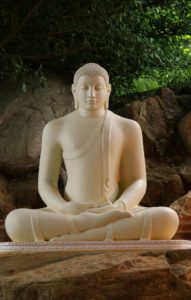Many years ago, I worked for a guy who could levitate. He meditated for long periods every day, and one spring he went to a retreat where the participants learned how to levitate through focusing their energy in a certain way. I was skeptical, so one day at lunch I asked him if he would levitate for me. Right there in the restaurant, he got on the floor, crossed his legs, closed his eyes, and began to gather his energy. His body lifted off the floor and skipped across the restaurant like a stone skipping across water, all while maintaining his seated cross-legged position. No muscles were involved—it was pure energy that moved him. This is true; I saw it happen. This was in the 80’s in Boulder, and no one cared that some guy was flying across the restaurant.
I have never been much of a meditator myself. I’d try from time to time; closing my eyes, focusing on my breath, and trying to find calmness among the clutter in my mind. Inevitably, my back would start to hurt, my mind would wander away, and my breath was boring. I’d last a minute or two and give up, deciding that meditation just wasn’t my thing.
If there’s one thing you can count on in life, it’s that things change. The work that I love began to be stressful, my kid got really sick, and sleep  became a nightly battle. In an attempt to get to sleep naturally, I downloaded an app that offered hypnosis and guided imagery to quiet my monkey mind and talk me off the ledge and into sleep. Not only did the app help me drop off, but I came to look forward to the bedtime recordings that would seduce me into the world of deep and restful sleep.
became a nightly battle. In an attempt to get to sleep naturally, I downloaded an app that offered hypnosis and guided imagery to quiet my monkey mind and talk me off the ledge and into sleep. Not only did the app help me drop off, but I came to look forward to the bedtime recordings that would seduce me into the world of deep and restful sleep.
This app was my gateway drug into the world of meditation and mindfulness. Not long ago, a patient recommended an app called Insight Timer, which offers over 8,000 free meditations, visualizations, music, and a timer for unguided meditation. There are a number of apps out there; this is just what has worked for me.
Meditation is an important part of well-being in Chinese medicine. They say that the emotions are the cause of a thousand diseases, and a calm mind is the cornerstone to good health. Meditation is practiced as a part of Chinese medicine in a number of ways, including Zen Buddhist meditation, and Qi Gong—a moving meditation similar to Tai Qi.
Besides calming your mind, meditation is good for your overall health. There are reams of research that document the benefits of a meditation practice. Among them:
-Meditation decreases stress. In doing so, your cortisol levels drop, decreasing stress-related inflammation. In Western medicine, you could say that stress is the cause of a thousand diseases, and any health problems you may have are further aggravated by stress. Meditation can help reverse that cycle.
-Meditation can control anxiety. I can confirm this one. When my mind is getting ahead of myself with worry and what if’s, meditation pulls me back into the moment. And if you can stay in the moment, everything is actually okay.
-Your self-awareness is increased when you meditate. You become more mindful of the thoughts you’re having and how you react to those thoughts. I’ve come to learn that it’s not the thoughts that are disturbing, it’s how we react to them.
-Meditation helps to increase your attention span by being more mindful of the here and now.
-Meditation can help you sleep better. I’ve found that the incidence of monkey mind has decreased dramatically, and when my mind starts jumping around, I’m able to rein it back in far more easily.
So how do you go about starting to meditate? It can be as simple as sitting or lying comfortably and paying attention to your breath. You can count; one on the inhale and two on the exhale. Or you can inhale calm and exhale tension; whatever works for you.
It’s far better to meditate for a small amount of time each day than to meditate for longer one day a week. Start with two minutes a day, ideally first thing in the morning. After a week of two minutes a day, bump it up to three or four minutes each day. If you keep comfortably increasing the amount of time spent daily, in a couple of weeks, you’ll be up to ten minutes of meditating, and that’s a respectable place to be.
There’s no right or wrong way to meditate. Thoughts will come and go, and you’ll get distracted—that’s fine. When it happens, just acknowledge those thoughts and let them pass, like clouds floating by.
If you need a little help in the form of guidance from a friendly voice or calming meditation music, download Insight Timer or some other app that offers guided meditation. It’s what really helped me develop a meditation habit. Like a smoker trying to quit, I started and failed to get into a meditation routine over the years. However, when my life became really difficult and I had the most to gain from meditation, it seemed to find me.



